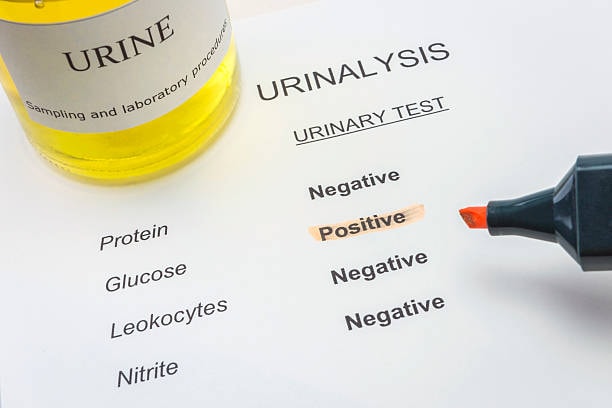
Urine Routine Test: Normal Range, Report Values, and Cost
Time to read 9 min
Time to read 9 min
Table of contents
Urine is a waste-producing liquid containing various waste products eliminated by the body and shows the metabolic processes of the body. Urine test marker analysis helps assess organ function, detect diseases such as liver disease, and monitor ongoing treatment. It can help diagnose urinary tract infections, ketosis, diabetes mellitus, bile duct concerns, liver and kidney problems, and pregnancy-associated problems.
The urine routine test is a normal diagnostic test ordered during a routine medical exam to evaluate your health and its clinical significance . It involves assessing the physical, chemical as well as microscopic characteristics of urine to recognize potential health concerns including urine infections, metabolic disorders, and kidney problems. The urine test, a part of routine health checks, offers important insights into various aspects of your health.
Your healthcare provider may recommend a urine normal test (Urinalysis) for various reasons:
A urine routine test or microscopic urinalysis, which includes a microscopic exam, is a common laboratory examination that involves analyzing the physical chemical and microscopic characteristics of the urine of an individual. It is used to detect various health conditions such as urinary tract infections (UTIs) and kidney function.
Generally, the purpose of a urine routine test is to diagnose various health conditions, monitor the development of certain health issues, and the effectiveness of ongoing treatments, routine health check-ups, pregnancy, and preparation before surgery.
The urine routine test measures various components in urine. These components are color, clarity level, odor, pH, particular gravity, and substances found in urine such as ketones, glucose, protein, nitrites, bilirubin, blood, urobilinogen, and leukocyte esterase.
Physical components (color, clarity, and odor of the urine).
Chemical components (glucose, protein pH, ketones, bilirubin, and some other substances).
Microscopic components (red blood cells, white blood cells, crystals, bacteria, and other microscopic components).
A standard urinalysis or urine routine test measures various indicators including:
A routine urine test offers a basic overview of your urine detecting possible abnormalities and may also lead to false positive results. On the other hand, urine culture test particularly tests for the existence and types of fungi or bacteria causing an infection.
Assesses general urine abnormalities such as pH, blood cells, and glucose. It can detect health conditions like infections, chronic kidney disease kidney problems, and diabetes. It analyses color, pH, specific gravity, bacteria, etc. Normal test results signify a balanced pH, no protein, no glucose, and absence of white and red blood cells. Usually, the test results are available within a few hours.
Urine culture particularly detects the type of bacteria or fungi causing a urinary tract infection (UTI) or acute tubular necrosis. and recognizes which antibiotics are efficient. The urine sample is put in a growth medium and examined for fungal or bacterial growth. If the growth exists, the type of infection-causing bacteria or fungi is detected and it is tested for antibiotic sensitivity. Usually, the culture test results are available in 2-3 days.
Look at the table mentioned below to understand the key differences better:
Routine Urine Test |
Urine Culture Test |
A general impression of urine recognizing various oddities |
Particularly detects infection and antibiotic sensitivity |
Checks urine characteristics and components |
Checks the existence and type of infection-causing fungi or bacteria |
Specifies typical abnormalities |
Recognizes particular pathogens and their sensitivity |
Typically the result is available within a few hours |
Usually, the result is available in 2-3 days |
Typically the urine test involves visual, chemical, and microscopic inspection to diagnose potential health conditions. The common components of a urine analysis include:
Color: Typically the color of urine is pale yellow and any variations in urine color may indicate dehydration, certain medical conditions, and certain medications.
Clarity: The normal fresh urine is clear however the urine that appears cloudy may indicate the existence of crystals, bacteria, or blood cells.
pH: pH assesses the alkalinity or acidity of the urine that is influenced by various medical conditions and your diet.
Specific gravity: It evaluates the intensity of substances in the urine revealing how well your kidneys are concentrating the urine.
Protein: The existence of protein in the urine is called (proteinuria) and can indicate kidney disease or some other medical conditions.
Glucose: If your urine has increased levels of glucose that may indicate kidney problems or diabetes.
Ketones: As the body breaks down fat, it produces ketones and their existence in urine shows starvation or metabolic concerns.
Bilirubin and Urobilinogen: The presence of bilirubin in your urine indicates liver problems.
Nitrites: Certain bacteria produce nitrites thus the existence of nitrites in urine suggests a urinary tract infection.
Leukocyte esterase: It is an enzyme created by white blood cells and indicates a urinary tract infection.
Blood: If there is blood found in the urine sample it's called hematuria and indicates kidney stones, urinary tract infections, and other medical problems.
Cells: White blood cells, red blood cells, epithelial cells, and other cells help recognize infections and other medical conditions.
Crystals: The existence of crystals in urine that include uric acid crystals or calcium oxalate may indicate dehydration or kidney stones.
Casts: These are developed in the kidneys and their presence in urine suggests kidney disease.
Yeast, bacteria, or parasites: Identifying these microorganisms in the urine sample signifies certain infections and other medical conditions.
Have a look at the table of urine analysis report normal values:
Characteristic |
Normal Value |
Color |
Pale Yellow |
Clarity |
Clear |
Bilirubin |
Negative |
Glucose |
Negative or trace |
Blood |
Negative or trace |
Ketones |
Negative or trace |
Protein |
Negative or trace |
Leukocytes esterase |
Negative or trace |
Nitrite |
Negative |
pH |
5.0-8.0 |
Urine specific gravity |
1.005-1.030 |
Bacteria |
None |
Casts |
0/ Low Powered Field |
Urine RBC |
0-3/ High Powered Field |
Urine WBC |
0-5/ High Powered Field |
Yeast |
None |
The urine routine test report offers significant insights into the health of an individual, helping to assess conditions like high blood pressure.
If your urine test results don’t match the urine routine test results' normal range that indicates potential health concerns. If your test results show abnormal values you must consult your healthcare provider to understand if it indicates a health condition. The healthcare professional will assess your test reports, medical history, current medications, and symptoms and tell you if any further testing is required.
Certain medications (Metronidazole) and health supplements (Vitamin C supplements) may interfere with urinalysis test results. Contamination of germs or any other substances such as menstrual blood or vaginal discharge during urine sample collection can also meddle with the urine test results. If you want to discuss your urinalysis results or you notice any changes in the color, odor, or consistency of your urine, seek medical advice from your healthcare provider.
At-home urine test kits are a quick and convenient option on the other hand lab-based tests present a detailed view and precise results. Usually, laboratory tests are more reliable as they can detect an extensive range of components including urine volume .
In simple words, at-home urine test kits are convenient to use, offer immediate results, are less expensive, carry the risk of false negatives or positives, are less accurate, and detect certain substances depending on the kit you purchase. While lab-based tests are more reliable, and accurate, use standardized testing techniques, examine an extensive range of substances, follow strict methods, and offer more refined insights.
Typically, a urine routine test is ordered as a part of a normal health checkup. Healthcare professionals recommend urine tests if they suspect an infection or to investigate urinary tract infections, diabetes, kidney concerns, or other health problems. A urine test is also conducted to screen existing health conditions, during pregnancy and before the surgery.
If you are experiencing persistent symptoms including frequent urge to urinate, painful urination, dark urine, abdominal pain, blood in urine, or back pain, you may need a urine test for further evaluation. These symptoms may indicate various health concerns such as kidney problems, urinary tract infections, and even cancer.
Consume enough water and fluids before the urine test to make sure your body can pass the urine smoothly. Maintain intimate hygiene to avoid collecting infected urine samples. It is advised to use the clean midstream method to collect urine samples as it is the best way to ensure precise results and correct diagnosis.
The morning sample or collecting the first urine void as you wake up in the morning is preferred over the random daytime urine sample. This is because the morning urine sample is not significantly affected by hydration status or physical activity.
A urine test or urinalysis gives insight into your urinary tract and kidney health by investigating the visual, chemical, and chemical components of urine. Timely urine testing as recommended by your doctor is important to detect various medical conditions such as kidney diseases, urinary tract infections, diabetes, and liver conditions. It helps screen the overall health of an individual and track the success of current treatments. To avoid severe complications make sure you consult your healthcare provider to understand your urine test results and what does it mean. Medical professionals can interpret the results accurately and recommend necessary tests and treatments.
If your urine test results indicate the presence of sugar or protein you need to consult a healthcare professional. Protein may indicate kidney problems while sugar is usually linked to high blood sugar or diabetes. Your healthcare provider may recommend further tests to determine the exact cause and the right treatment.
Yes, certain medications (decongestants, antidepressants, and dextromethorphan) may lead to false positive urine test results.
Usually, urine test results are available within 1-2 days depending on the type of test and diagnostic center.
Generally, a urine routine test is recommended as a part of a normal health checkup annually. However, the frequency of urine depends on the age, symptoms, health condition, and risk factors of an individual.
***Medical Disclaimer - The following information is for educational purposes only. No information provided on this website, including text, graphics, and images, is intended as a substitute for professional medical advice. Please consult with your doctor about specific medical advice about your condition(s).
